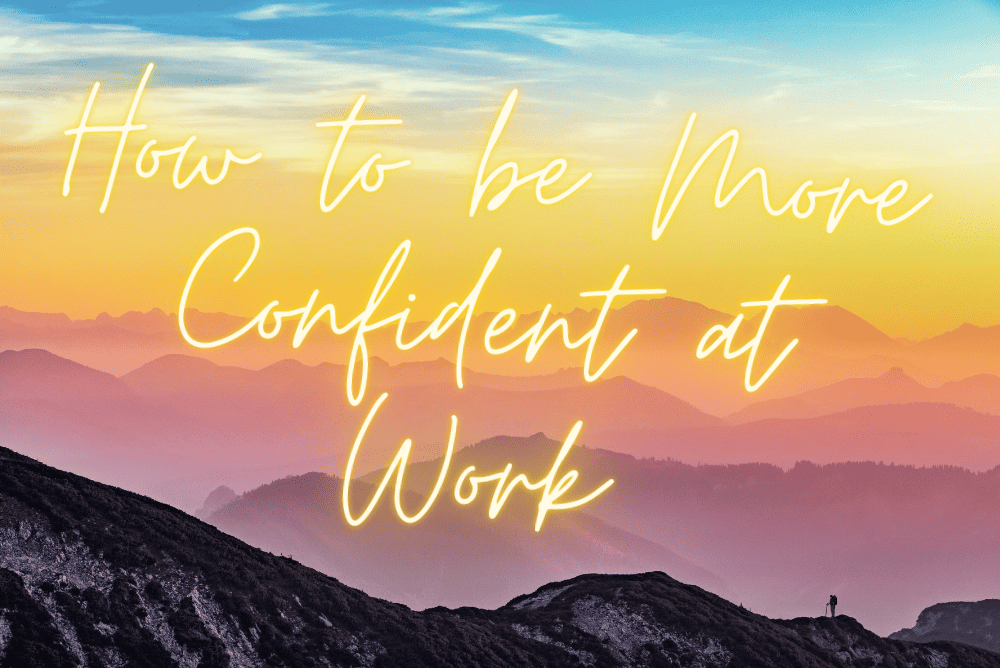Last updated on August 25th, 2025
Confidence is a vital trait to have in the workplace. It enables us to communicate effectively, make decisions, and build relationships with our colleagues. If we don’t have confidence, we might hold back, second-guess ourselves, and miss out on chances.
As someone who has struggled with feelings of inadequacy and self-doubt in the past, I understand how challenging it can be to build confidence at work. I remember feeling hesitant to speak up in meetings.
I knew that if I wanted to succeed in my career, I needed to overcome my fears and doubts and learn to trust in my abilities.
So, I started to work on building my confidence. I read books, I listened to podcasts, and I sought out mentors. It was a journey, but as I progressed, I noticed positive changes in myself. I became more assertive, more decisive, and more willing to take on new challenges. I’ve also seen improvements in how I get along with my coworkers and how happy I am with my job overall.
I believe that confidence is a skill that can be developed, and my goal is to help you build your own confidence and achieve your professional goals. I hope to give you the tools and encouragement you need to take control of your career, trust yourself, and build the confidence you need to succeed.
Understanding Confidence
Confidence is often defined as a belief in one’s abilities, qualities, and judgment. It’s the feeling of trust and assurance in oneself and one’s abilities. Confidence allows us to take risks and pursue our goals with determination and resilience.
On the other hand, arrogance is often defined as an overestimation of one’s abilities and importance. A sense of entitlement, not being able to take criticism, and not caring about other people are all signs of arrogance.
It’s important to note that confidence and arrogance are two different things, and although they may seem similar, they have very different effects on our personal and professional lives.
Confidence is built on three key elements: self-awareness, self-esteem, and self-assurance. Self-awareness is the ability to understand our own strengths and weaknesses and how they affect our behavior and our relationships.
The belief in our own worth and the value of our own contributions is referred to as self-esteem. Self-assurance is the belief in one’s ability to achieve one’s goals as well as the ability to trust oneself and one’s abilities.
Having a good balance of these elements is crucial for building and maintaining confidence.
Without self-awareness, we may not understand how our actions and behaviors affect our relationships and opportunities.
Without self-esteem, we may not believe that we are worthy of success or that our contributions are valuable.
Without self-assurance, we may not trust in our own abilities or take risks to achieve our goals.
I’ve learned that it’s important to have a good balance of these things if you want to build and keep your confidence. It’s also important to remember that confidence is not something that we have or don’t have; it’s something that we can develop and work on over time.
Identifying Workplace Triggers
One of the most important steps in building confidence at work is to identify what triggers your lack of confidence. Triggers can be different for everyone and vary depending on the situation.
For some, it might be speaking in public; for others, it might be a challenging project or a difficult conversation with a coworker or a manager.
Personally, I have found that one of my triggers is when I am in a meeting with my boss and colleagues. I tend to doubt my ideas and hold back on speaking up. I was aware of this trigger, but I didn’t know how to address it.
So I decided to take a closer look at what was causing this lack of confidence. I realized that the root cause was my fear of rejection and being judged.
Once I identified my triggers, I was able to address them. I started to practice speaking up in meetings, even if it was just to share a small idea. I also started to remind myself that my ideas were valuable and that I had something to contribute.
I also started to work on my self-esteem and confidence. I practiced setting goals, accepting my strengths and weaknesses, and challenging negative thoughts.
Building Self-Awareness
Self-awareness is a crucial aspect of building confidence. It’s the ability to understand and acknowledge our own thoughts, feelings, and behaviors, and how they affect our relationships and opportunities.
When we know ourselves, we can make better decisions, set goals that are realistic, and talk to others in a clear way.
Journaling has helped me learn more about myself. Writing down my thoughts and feelings helped me identify patterns and triggers that I wasn’t aware of before. It also helped me to reflect on my behavior and my decision-making process.
I also found that mindfulness practices like yoga and meditation helped me be more in the moment and watch my thoughts and feelings without judging them.
Another important aspect of self-awareness is seeking feedback from others. I found that getting feedback from my colleagues, friends, and family helped me understand how others perceive me and how my actions and behavior affect others.
It also helped me identify areas where I needed to improve and set specific goals for my personal development.
Developing Self-Assurance
Self-assurance is the belief in one’s ability to achieve one’s goals as well as the ability to trust oneself and one’s abilities. It’s what gives us the confidence to take risks, go after our goals, and face problems head-on.
When we have self-assurance, we are more likely to believe in ourselves and our abilities, even in the face of uncertainty or failure.
Personally, I have found that developing new skills has been a powerful tool for building self-confidence. Learning new things helps to expand our abilities and our understanding of the world around us.
It also helps to break out of our comfort zones and see that we are capable of more than we might have thought. I also found that taking risks and facing fears is a powerful way to build self-assurance.
It helps us understand that we can handle difficult situations, and that failure is not the end of the world.
Another important aspect of self-assurance is being resilient. Resilience is the ability to bounce back from adversity and keep going even when things get tough.
I found that when I remind myself to be resilient, I am more likely to keep going, even when things get difficult.
Confidence at Work
Confidence is an essential trait to have in the workplace; it enables us to communicate effectively, make decisions, and build relationships with our colleagues.
When we are confident, we are more likely to speak up in meetings, take on new projects, and take risks that can lead to new opportunities.
I’ve found that building my confidence has made a big difference in my career. I used to be hesitant to speak up in meetings, but now I am more assertive and willing to share my ideas.
I used to be hesitant to take on new projects, but now I am more willing to step out of my comfort zone and try new things. I have also noticed that building my confidence has helped me build better relationships with my colleagues and my managers.
Here are some specific steps that you can take to build confidence at work
1. Speak up in meetings and share your ideas. Don’t be afraid to express yourself and participate in discussions. This can help you build confidence in your ability to communicate effectively and to be heard.
2. Set specific, measurable, and achievable goals for yourself. By setting goals, you can focus on what you want to accomplish and track your progress as you work towards achieving them. This can help you build confidence in your ability to achieve your goals.
3. Take on new projects and challenges. Stepping out of your comfort zone and trying new things can help you build confidence in your abilities and gain new experiences.
4. Learn new skills and expand your knowledge base. By learning new skills, you can become more valuable to your organization and to yourself and increase your confidence in your abilities.
5. Seek feedback from colleagues and managers. Feedback can tell you a lot about how others see you and what you can do to get better. It can also help you identify areas where you need to focus on building your confidence.
6. Practice active listening and effective communication. Communication is a critical aspect of building confidence. You can build stronger relationships with your coworkers and managers if you learn to listen actively and talk clearly.
7. Take initiative and volunteer for new opportunities. Showing initiative and volunteering for new opportunities can help you build confidence in your ability to lead and take charge.
8. Dress professionally and present yourself well. The way you present yourself can have a big impact on how others perceive you and how confident you feel. Dressing professionally and putting on a good show can help you feel good about how you look and how you can make a good impression.
9. Speak confidently and clearly. Speak clearly, use a strong and steady voice, and avoid filler words and phrases. This can help you feel more confident in your ability to communicate clearly and well.
10. Make eye contact and use body language that exudes confidence. Eye contact and confident body language can help you feel better about yourself and your ability to talk to other people.
11. Be organized and prepared for meetings and presentations. Being organized and prepared can help you build confidence in your ability to handle important tasks and make a positive impression.
12. Be punctual and reliable. Being on time and dependable can help you feel more confident in your time management and dependability.
13. Take care of your physical and mental well-being. By taking care of your physical and mental well-being, you can build confidence in your ability to handle stress and perform at your best.
14. Surround yourself with positive and supportive people. Surrounding yourself with positive and supportive people can help you build confidence in yourself and in your abilities.
15. Identify and challenge your limiting beliefs. By figuring out what your limiting beliefs are and putting them to the test, you can build confidence in your ability to get past problems and reach your goals.
16. Keep a journal to reflect on your progress and growth. Reflecting on your progress and growth can help you build confidence in yourself and in your abilities. Keeping a journal can also help you figure out patterns and triggers that might be hurting your confidence.
17. Seek mentorship or coaching. As you try to build your confidence, a mentor or coach can give you helpful advice, support, and feedback.
18. Take time to celebrate your successes, big and small. Recognizing and celebrating your successes, no matter how small, can make you feel more confident in your ability to reach your goals.
19. Practice assertiveness and boundary-setting. Being assertive and setting boundaries can help you build confidence in your ability to communicate effectively and to take charge of your own life.
20. Believe in yourself and trust in your abilities. Ultimately, building confidence is about believing in yourself and trusting in your abilities. It’s important to remember that confidence is not something you have or don’t have; it’s something you can develop over time.
These steps are not an exhaustive list and may not apply to every person and every situation, but they are a good starting point for anyone looking to build their confidence at work.
Be aware that building confidence takes time and patience, and it’s important to be kind to yourself and to focus on progress rather than perfection.
Conclusion- How to be More Confident at Work
In this article, we discussed the importance of confidence in the workplace and provided a detailed list of steps that can be taken to build confidence.
We highlighted the key elements of confidence, including self-awareness, self-esteem, and self-assurance.
We also shared personal experiences and tips on how to increase self-awareness, develop self-assurance, and take specific steps such as speaking up in meetings, taking on new projects, and asking for a promotion.
To conclude, building confidence is a journey that requires patience and persistence.
It’s important to be honest with yourself, to identify and address your triggers, to set goals and track your progress, and to surround yourself with positive and supportive people.
Remember that building confidence is not a destination but a continuous process, and it’s important to celebrate your successes, big and small.
My final thoughts on building confidence are that it’s an ongoing process, and it’s important to be patient with yourself and to focus on progress rather than perfection.
It’s also important to remember that everyone’s journey is different, and what works for one person may not work for another.
I encourage you to find what works for you and to trust the process. Building confidence takes time, but with patience and persistence, you will get there.
Ready to take control of your mindset transformation journey? Check out Pheelpretty.com resources.
Don’t miss out on this opportunity to improve your self-confidence, self-esteem and self-care. Sign up now and start your journey to feeling your best!




